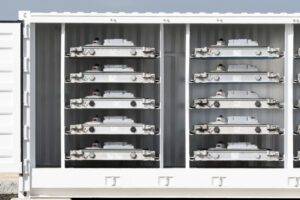
Jaguar Land Rover (JLR) and Wykes Engineering are teaming up to develop what they claim will be one of the UK’s largest energy storage systems made from old electric car batteries.
The two firms have announced today JLR is set to supply second-life batteries originally used for its Jaguar I-PACE electric vehicles (EVs) to renewables technology specialist Wykes Engineering, which then plans to slot these batteries into an energy storage system at a renewable energy part in Northamptonshire.
The battery storage system is to be spread across three locations at the Wykes-owned Chelveston renewable energy park, which boats over 85MW of installed wind and solar generation on site. The park is capable of producing 175,000MWh of electricity per year, which is enough to power more than 60,000 homes in the local area, according to JLR.
The batteries for the proposed facility have been taken from prototype and engineering test vehicles, with JLR hoping to supply enough batteries to store 7.5MWh of energy – enough to power 750 homes for a day – by the end of 2023.
According to JLR, batteries are simply removed from its Jaguar I-PACE and slotted into racks in containers on-site, with a single system housing 30 second-hand units and capable of storing up to 2.5MWh of energy at full capacity.
Moreover, each system is linked to an advanced inverter to maximise efficiency and manage energy, and is capable of supplying power direct to the grid during peak hours, in addition to drawing power out of the grid during off-peak hours to store for future use.
JLR said its second-life EV batteries were still able to be deployed in low-energy situations even after their performance falls below the stringent requirements of an electric vehicle, which typically still leaves a battery with as much as 80 per cent of its original capacity.
However, once the battery health falls below the required level for these second-life use cases, JLR said it planned to recycle the batteries to recover raw materials for re-use.
The partnership is designed to support JLR’s circular economy efforts as well as its ambition to achieve net zero emissions by 2039, according to François Dossa, executive director of strategy and sustainability at the automaker.
“Our sustainability approach addresses the entire value chain of our vehicles, including circularity of EV batteries,” Dossa explained. “Our EV batteries are engineered to the highest standards and this innovative project, in collaboration with Wykes Engineering, proves they can be safely reused for energy sector application to increase renewable energy opportunities. Using the 70 to 80 per cent residual capacity in EV batteries, before being recycled, demonstrates full adoption of circularity principles.
“Working together with industry-leading partners, we are developing a complete EV ecosystem, from batteries to charging, supporting our net-zero transformation.”
According to McKinsey & Company research, second-life battery supply for stationary applications, such as renewable energy storage, could exceed 200 gigawatt-hours per year by 2030, creating a over $30bn of economic value globally.
David Wykes, managing director of Wykes Engineering, added that the partnership with JLR could present a solution to potentially costly grid capacity issues.
“One of the major benefits of the system we’ve developed is that the containers are connected to the Grid in such a way that they can absorb solar energy, that could otherwise be lost when the grid reaches capacity,” he said. “This excess energy can now be stored in the second life I-PACE batteries and discharged later. This allows us to ‘overplant’ the solar park and maximise the amount of power we generate for the area of land we are using.”
The new follows last month’s announcement that JLR’s parent company Tata Group plans to build a flagship £4bn gigafactory in the UK – its first battery factory outside India – after months of negotiation with government to secure a major support package.
The new battery factory is reportedly earmarked for a site in Somerset and is expected to create around 4,000 UK jobs as well as thousands more across its supply chain, providing a major boost to the UK’s fledgling EV manufacturing industry.
The automaker has also recently set out plans to invest £15bn over the next five years in ramping up its electric vehicle offering, including through the production of its new all-electric Jaguar and Range Rover models at manufacturing sites in the UK.
Read more:
Jaguar to repurpose used EV batteries for Northamptonshire energy storage system




